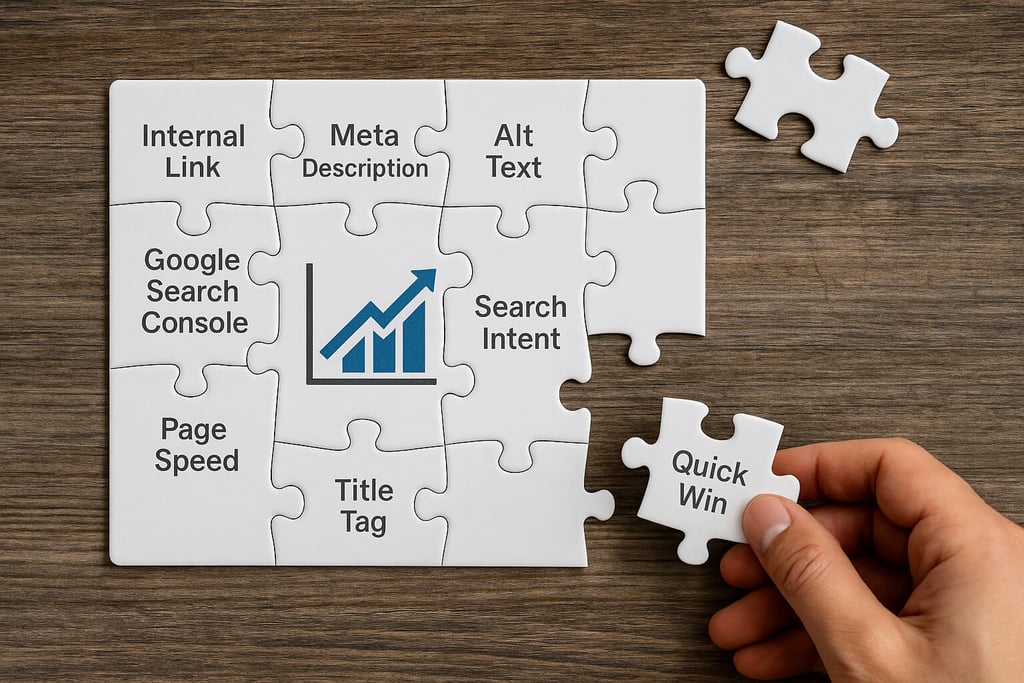SEOJet Flight Blog
20 SEO Quick Wins: Fast SEO Fixes to Boost Your Ranking
20 SEO Quick Wins: Boost your ranking fast with these SEO fixes! Simple search engine optimisation tricks for quick SEO gains & better search engine ranking.
SEO STRATEGY
Ardene Stoneman
5/21/20256 min read


SEO Ranking Quick Wins: 20 Ways to Improve Fast
Not every improvement to your website’s SEO has to be slow or complicated. Some fixes and tweaks can provide a fast impact on your rankings - if you know where to look.
In this article, we’re covering 20 quick SEO wins that can help search engines better understand your content and give your site a push in the right direction.
These aren’t long-term strategies, but they can make a noticeable difference quickly.
Article Outline
What is a Quick SEO Win?
Can Quick Fixes Really Improve Your SEO Ranking?
How to Use Technical SEO for a Quick Win
Why Internal Links Still Matter
Which On-Page SEO Elements to Prioritise
Is Your Content Matching Search Intent?
How a Simple SEO Checker Can Reveal Big Issues
Should You Be Using Google Search Console More?
What Are the Best Quick SEO Tips for Better Rankings?
Are You Ignoring These SEO Tweaks?
Why Long-Term SEO Still Needs Short-Term Wins
Are You Helping Google Understand Your Pages?
Does Your Site Structure Help Search Engines?
What Do Search Engines See When They Crawl Your Pages?
Can You Improve Rankings Without New Content?
Should You Optimise for Search Queries or Topics?
How to Signal to Google That Your Site is Relevant
Are You Getting Clicks From the Search Engine Results Pages?
What Are 10 Quick SEO Fixes You Can Do Today?
How to Make These SEO Wins Part of a Sustainable SEO Strategy
1. What is a Quick SEO Win?
A quick SEO win is a small change you can make to your site that has a direct and fast impact on your SEO ranking.
These don’t replace proper long-term SEO strategies, but they can improve your site’s visibility in the short term.
Quick wins often address issues that stop search engines from fully understanding your content or reduce your chances of ranking higher.
2. Can Quick Fixes Really Improve Your SEO Ranking?
Yes, but only to a point. You can boost your search engine rankings with tweaks that remove obstacles for search engines or clarify your content’s purpose.
These improvements help search engines understand what your site is about, and that can lead to better rankings and increased traffic - especially for pages that are close to page one already.
3. How to Use Technical SEO for a Quick Win
Technical SEO is often where the easiest fixes are. Make sure:
Your pages load fast
You have a mobile-friendly design
You’ve fixed broken internal links
There’s only one version of each URL indexed
Use tools like Google Search Console and a page SEO checker to spot these issues. Even correcting small errors can make it easier for search engines to crawl and index your site.
4. Why Internal Links Still Matter
An internal link structure that makes sense helps search engines understand your site’s hierarchy. More importantly, it passes authority between pages. Make sure:
Every important page is linked to from somewhere
You’re using relevant anchor text
Older content links to newer content
It’s one of the easiest SEO tasks to fix, and it’s often overlooked.
5. Which On-Page SEO Elements to Prioritise
You don’t have to rewrite everything. Focus on:
Title tags: Use keywords naturally and keep them under 60 characters
Meta descriptions: Include search terms and a reason to click
H1s and subheadings: Help search engines understand the structure
Image alt text: Useful for Google and users alike
These elements help search engines better understand your content and influence how your pages appear in search engine results.
6. Is Your Content Matching Search Intent?
If your content doesn’t match what users are looking for, it won’t rank - no matter how good it is. Check the top search engine results for your main keywords.
Are they blog posts? Product pages? Lists? Match that format. You’ll improve your chances of ranking higher by aligning with search intent.
7. How a Simple SEO Checker Can Reveal Big Issues
Use a tool like Screaming Frog, Ahrefs, or a free SEO checker. These can flag:
Duplicate content
Missing meta tags
Slow pages
Redirect chains
Fixing these issues can help search engines understand your site better and improve your search engine rankings quickly.
8. Should You Be Using Google Search Console More?
Yes. It’s free, and it’s from Google. Use it to:
Spot indexing issues
Submit new pages
Review performance data
See which search queries are bringing in traffic
If Google isn’t indexing a page, it won’t appear in the search engine results pages - no matter how good the SEO is.
9. What Are the Best Quick SEO Tips for Better Rankings?
Some tips that offer quick improvements:
Add internal links to underperforming pages
Rewrite meta descriptions to improve click-through rate
Remove or redirect broken links
Compress large images to speed up load time
Use structured data on product pages
All of these tasks help Google and other search engines better understand your pages.
10. Are You Ignoring These SEO Tweaks?
Many sites miss small tweaks that can lead to a quick SEO win:
Updating old content with fresh information
Adding missing alt text to images
Creating a better mobile layout
Reducing the number of H1 tags per page
None of these are complicated, but they all send useful signals to search engines.
11. Why Long-Term SEO Still Needs Short-Term Wins
Long-term SEO strategies take months to show results. But that doesn’t mean you should ignore small improvements. Quick SEO wins help maintain momentum and show early results - especially useful if you’re reporting to clients or stakeholders.
12. Are You Helping Google Understand Your Pages?
Google uses structured data and headings to work out what a page is about. You can help Google understand your content by:
Using clear headings
Adding schema markup where relevant
Organising pages into logical sections
If search engines can easily understand your content, you’re more likely to appear in relevant search engine results.
13. Does Your Site Structure Help Search Engines?
Make your site easy to crawl. A few rules:
Use a clear and simple navigation menu
Keep URLs short and consistent
Avoid orphan pages (pages with no internal links)
A strong site structure helps search engines understand your content better and improves the flow of authority between pages.
14. What Do Search Engines See When They Crawl Your Pages?
Search engines don’t view your site like a human. They rely on:
HTML structure
Tags
Load speed
Internal links
Sitemaps
Using tools like Google Search Console can help you view your site as Google sees it. Fixing crawl errors is one of the simplest ways to boost your SEO.
15. Can You Improve Rankings Without New Content?
Absolutely. Some of the best SEO improvements come from working on what’s already there. You can:
Combine underperforming pages into one stronger page
Improve readability and formatting
Add new internal links
Update old data or links
Improving site structure and clarity helps search engines understand your content better - and gives users a better experience.
16. Should You Optimise for Search Queries or Topics?
Search engines are now better at understanding topics, not just keywords. That said, don’t ignore keywords entirely. A good approach is:
Base your content on a broader topic
Include related search queries naturally
Use tools like Google Analytics and Google Search Console to find what terms people use
This improves your site’s relevance and gives you more chances to appear in search engine results.
17. How to Signal to Google That Your Site is Relevant
Google looks at many signals. Some easy ones to control:
Keyword in title and H1
Internal links pointing to the page
Fresh content
Fast load speed
Low bounce rate
Each of these sends a message to Google that your site is active, useful, and worth ranking.
18. Are You Getting Clicks From the Search Engine Results Pages?
Ranking is only part of the job. You also need clicks. Improve your click-through rate by:
Writing better meta descriptions
Using structured data to show review stars or prices
Adding numbers or benefits to your titles
This won’t directly change your rankings, but if more people click on your result, Google might see that as a positive signal.
19. What Are 10 Quick SEO Fixes You Can Do Today?
Add missing meta descriptions
Compress oversized images
Remove or redirect broken links
Add internal links to isolated pages
Update title tags with natural keywords
Submit your sitemap via Google Search Console
Use HTTPS if you haven’t already
Fix crawl errors
Write unique alt text for images
Improve mobile responsiveness
Each of these can improve site performance or make it easier for search engines to crawl your content.
20. How to Make These SEO Wins Part of a Sustainable SEO Strategy
Don’t treat SEO quick wins as a one-off job. They should be part of your regular checks. Set up a system to:
Monitor key pages using a tool like Google Analytics
Run SEO audits monthly
Keep a list of minor issues to tackle weekly
Build quick fixes into your long-term SEO strategy
Small fixes add up. And over time, they can significantly improve your SEO performance and rankings.
Summary: SEO Quick Wins That Work
Quick SEO wins are small, fast actions that can improve your site’s ranking
Technical SEO is often the best place to start
Internal linking and on-page SEO elements are easy to fix and effective
Use tools like Google Search Console and a good SEO checker
Don’t forget search intent - Google rewards relevance
Improve content clarity and structure to help search engines understand your site
Quick wins should complement, not replace, long-term SEO strategies
If you want help finding and fixing the SEO issues holding your site back, talk to SEOJet. We’ll help you make the most of the quick wins and build a proper plan for lasting results.
Services
Contact Us
Newsletter Signup
sales@seojet.co.uk
01934 289 404
© 2025. All rights reserved.


Locations
Weston-super-Mare
Somerset
Bristol
9am - 6pm, Monday to Friday
Suite 2, Unit 7, 12 Beaufigter Rd, Weston-super-Mare, BS24 8EE
